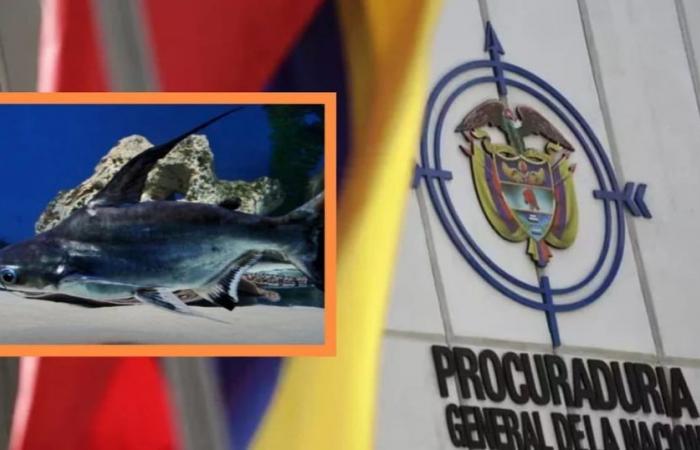
The Attorney General’s Office requested from the National Aquaculture and Fisheries Authority (Aunap) detailed information on the situation of the basa fish (Pangasianodon hypophthalmus) In colombia. According to experts, this invasive species represents a danger to aquatic ecosystems and can threaten native species.
In a communication addressed to Karen Elena Mejía Piñerez, director of Aunap, the control body requested precise data on the location, distribution and characteristics of the basa fish population in the country. The Public Ministry required to specify the body of water and the date of the last sighting reports, in addition to collecting data on sizes, measurements, sex and stomach contents of the specimens.due to the feeding practices of this species that can harm other forms of aquatic life.
Now you can follow us on our WhatsApp Channel and in Facebook.
In addition, the Delegated Attorney General’s Office with Mixed Functions 3 for Environmental, Mining, Energy and Agrarian Affairs asked the Aunap for reports on population studies of this species and reports on fish kept in captivity or in fish farming establishments. The location, type of facilities, those responsible, number of individuals and the objectives of the cultivation or reproduction of these fish must also be indicated.
“The Public Ministry monitors, from its powers, the situation presented with the Basa fish Pangasianodon hypophthalmus that can affect aquatic ecosystems and endanger native species in Colombian territory”, indicated the Attorney General’s Office through an official statement. It is important to mention that in recent days, artisanal fishermen from the department of Huila reported the possible presence of the basa fish in the Betania dam and in the Magdalena River, which led the Government of Huila to issue an alert and ask the National Authority of Aquaculture and Fisheries to take the necessary measures.
For all of the above, the Attorney General’s Office closely monitors the spread of the basa fish, an invasive species, similar to hippos in terms of environmental impact. Also known as pangasius, panga or basa catfish, it caught the attention of the authorities since 2014, the year in which Aunap prohibited its breeding. Coming from Southeast Asia, specifically from the Mekong and Chao Phraya rivers, in countries such as Thailand, Cambodia, Vietnam and Laos, its proliferation in the rivers and aquatic ecosystems of Colombia could displace native species.
Although there is no precise data on how and when this species arrived in Colombia, it is presumed that the basa fish entered illegally in the late 1980s. Various theories suggest that it entered in the form of eggs or as an ornamental species for aquariums. , from where it may have escaped and begun to reproduce. In 2015, sightings were recorded in the Magdalena River basin, and since then, fishermen have reported their presence more frequently.
In 2023, Colombia produced nearly 20,000 tons of this species, approximately 30 million individuals. In local markets in cities such as Bogotá, Bucaramanga, Cali, Medellín, Pereira and Barranquilla, you can find both fresh and gutted. In Medellín, basa fish represents 33% of the market, while in Pereira it reaches 53%, in Cali 29% and in Bogotá 26%.
Authorities express concern not only about the ecological impacts, but also about the risks to human health. Illegal farming of basa fish is carried out without health controls, which could lead to gastrointestinal diseases among consumers. In addition, the Ministry of the Environment identified more than 30 bacteria and 40 species of fungi associated with basa fish in Colombia, which implies an additional risk for native fauna.
At an economic level, the presence of fish based on the market represents unfair competition for legal species, affecting the profitability of sustainable aquaculture. This situation reflects a problem that is difficult to solve and has generated a debate around the possible legalization of the basa fish to better regulate its production and commercialization, although this would not solve the problem of its impact on biodiversity.




